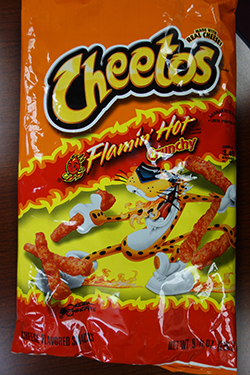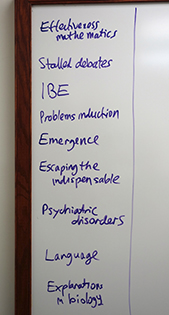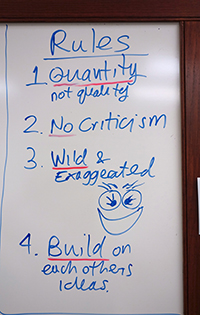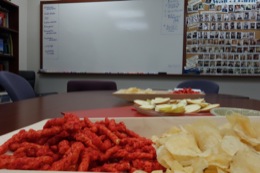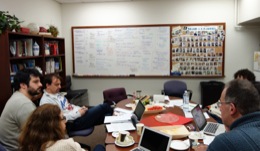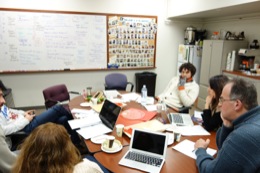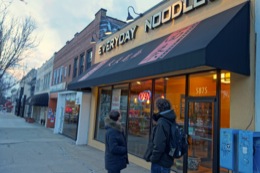

![]()
home
::: about
::: news
::: links
::: giving
::: contact
![]()
events
::: calendar
::: lunchtime
::: annual
lecture series
::: conferences
![]()
people
::: visiting fellows
::: postdoc fellows
::: resident fellows
::: associates
![]()
joining
::: visiting fellowships
::: postdoc fellowships
::: senior fellowships
::: resident fellowships
::: associateships
![]()
being here
::: visiting
::: the last donut
::: photo album
|
Brainstorming "Do you have sense of self worth and personal dignity?" That was the question I asked the reading group last week. I had scripted it carefully and rehearsed it silently several times so that I wouldn't flub the line. It produced the expected effect. The assembled Fellows sensed a trap and looked at one another in amusement. The rumble and mumble that followed led to some sort of agreement that they do have that sense. "Ah," I said, springing the trap, "that might be a problem for what I'm going to suggest we do." The suggestion is that we have true brainstorming session on problems in philosophy of science. I explained a little of how a brainstorming session works. There is a problem and we generate solutions, rapidly, in a non-judgmental environment that encourages wilder notions. Some of the Fellows seemed to think that was worth trying. Others were hanging onto personal dignity. "People who sell soap find it helps them to create novel ideas. Don't we have to be at least as creative?!" The remark had slipped out in a moment when I feared that dignity might carry the day. -------------- By the Monday before our meeting, everyone had emailed me a problem worthy of brainstorming. They were then assembled into a single document which was circulated ahead of time in email. It came with an ambitious instruction: "...be prepared to think thoughts about them that NO ONE HAS THOUGHT BEFORE!" Or did the email shouting make it more ominous than ambitious? -------------- On the day, I went to the whiteboard in our lounge and wrote up a shorthand list of topics on one side. On the other, I wrote the four rules of brainstorming introduced by Osborne in 1953: 1. Quantity, not quality That should, I hoped, relax the mood and loosen our thinking. A brainstorming session needs a warm up exercise. We need to shake out and limber up tired and tense mental muscles before working them, or so the book I'd read told me. For that, I had collected a rubber duck that squeaks when squeezed, a wooden abacus and some ping pong balls. They are not just any ping pong balls. These glow in the dark!
My plan is to keep these prompts hidden in a bag at my feet and produce them at the appropriate moment. Finally, since I've discovered that this group is salty, we've collected salty snacks to go with freshly sliced apple. ------------- So how did it go? It was not quite as I expected. We had a slow start. I'd thought and hoped that we'd soon flood the room with ever more exaggerated imaginings. It is one thing for a group to accept that goal in the abstract. It is quite another to face it in the concrete. Just what do you say about a rubber duck, a wooden abacus and ping pong balls, even if they do glow in the dark? We did not roar along. We crept along. My hope for the snap, snap, snap of ever wilder and exaggerated ideas collided headlong with the measured circumspection of cautious academics. Years of battle with critical foes have hammered our fear of public error and criticism into well-tempered armor.
As the meeting progressed, I could feel us loosening. We were working on just one of the nine problem up to be stormed. It is to do with mathematics, its unreasonable effectiveness and Platonism. A few times, I thought our creativity was exhausted and I began to close down the discussion. But then I hesitated. There is a rhythm to these sessions and I was learning it. There are quieter moments that come and pass. They are akin to the calm air before sky opens with rain. By the end of our session, we had managed only to discuss the first problem. I had badly underestimated how much time brainstorming needs. The whiteboard was now covered with lots of ideas: some tame, some crazy and some looking quite promising. Was it worth it? I think so. By the end of the meeting, there was a lively discussion well underway and a whiteboard covered with interesting thoughts. But what did the Fellows think? That is hard to know. Who among the indulgent Fellows wants to tell me that the session was a waste of time?! How could I know if they thought that? I took heart from one sign. Everyone readily agreed to pick up where we left off in the next available meeting and brainstorm on some of the problems we'd not had time to address. Dinner will be at the Everyday Noodle Shop. I look forward to their soup noodles and to being the tourist with the camera, watching the chefs pull noodles. John D. Norton
|
